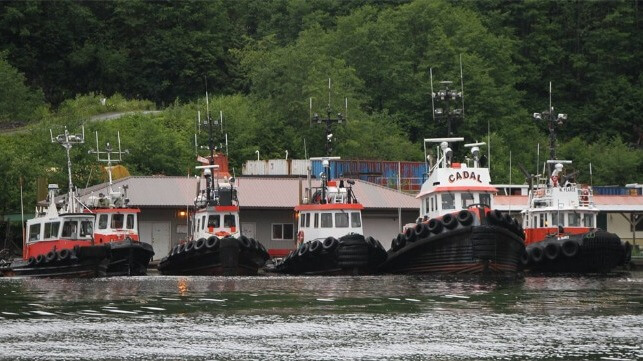Canadian Tug Company Fined for Fatal Accident as Safety Concerns Are Raised

A Canadian court sentenced the owner of a tugboat service and his company to pay C$310,000 in fines (US$231,260) for a 2021 incident in which the captain and one of two crewmembers aboard one of the company’s tugs died when the vessel sank in icy winter waters. The fines were levied after a plea deal was reached but the case has also focused attention on broader safety issues for small tugs working in Canada.
The incident took place while the tugboat Ingenika, a 14.6 gross ton vessel, was towing a 200-foot barge loaded with supplies for a drilling project. The vessel encountered bad weather conditions in the Gardner Canal in western Canada. The vessel, which was built in 1968 and powered by two diesel engines, began having trouble maintaining speed and controlling its tow. The vessel eventually began taking on water and sunk, while the barge broke free and drifted up on the shoreline.
There was a captain and two crewmembers aboard and they had enough time to abandon the vessel. One of the crewmembers made it to a lifeboat and was rescued 10 hours later suffering from hypothermia and frostbite. The bodies of the captain and the deckhand were later found and it was determined that while they had been able to get into their immersion suits, they were not properly secured which increased the chances of them being unable to move in the icy water before they became incapacitated and drowned or froze.
During the investigation, it was revealed that it was the deckhand’s first day on the job and testimony showed he had not been trained. The crew had not practiced the use of their survival gear and safety procedures.
The owner of the tug company, James Geoffrey Bates pleaded guilty in August 2023 to one of eight charges stemming from the incident under the occupational health and safety provisions of Canada’s Workers Compensation Act. He pleaded guilty to a charge of failing to provide workers with necessary information, training, and supervision. The judge imposed a fine of C$15,000 (US$11,236) on Bates and also sentenced him to 100 hours of community service.
Wainwright Marine, Bates’ company which was the operator of the tug, pleaded guilty to three of eight charges with a total of C$295,000 (US$216,464) in fines. As part of the plea deal, the five additional charges were stayed by the prosecution.
Previously, Transport Canada had also fined Wainwright Marine C$52,000 (US$38,585) on charges that they had not ensured the tug was properly staffed with a competent crew. In addition, Transport Canada found that they had not ensured that all employees held proper certificates for their positions. Bates Properties, the parent company of Wainwright Marine and the registered owner of the tug, was fined a further C$10,000 (US$7,400) for failing to ensure the tug met regulatory requirements.
Judge Nina Purewal told the court, “I am satisfied that the appropriate sentence in this matter is a fine and not imprisonment. And that the fines being proposed in my view take into account the seriousness of the offenses, but also the negligence of the defendants are properly balanced as a factor.”
The judge suspended the case till January so that the defendants and Canadian officials in consultation with the families of the two men lost could agree to plan for the use of the fines. They are to be applied in a way that is “meaningful to the victims’ families.”
The investigation into the loss however also renewed concerns over the safety regulations in Canada. Currently, Transport Canada does not certify tugs below 15 gross tons, and as such the vessel did not undergo regular safety inspections. It came out that although the Ingenika had been in operation for 55 years it had never been inspected. The Transportation Safety Board highlighted that it had raised these concerns to Transport Canada on several occasions after other accidents dating back to 2016.
“The Ingenika investigation highlights ongoing concerns about safety management and regulatory surveillance, two major systemic safety issues in the transportation industry that are part of TSB Watchlist,” said Kathy Fox, Chair of the TSB releasing the result of their investigation in March 2023. “Transport Canada needs to increase its surveillance of this vessel class and require owners and operators to assess risks adequately, and the Pacific Pilotage Authority needs to ensure that only qualified crew members and vessels are operating with pilotage waivers.”

that matters most
Get the latest maritime news delivered to your inbox daily.
The TSB issued four specific recommendations to Transport Canada calling for expanded surveillance to verify small tugs comply with regulations. They also called for risk assessments and found shortcomings with the Pacific Pilotage Authority’s implementation of its pilot waiver program.
The Ingenika was operating in a compulsory pilot area when it was lost. The TSB found that the Pacific Pilotage Authority was not verifying information submitted on pilot waiver applications.
